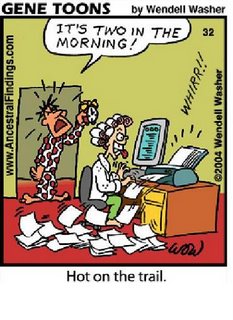One of the discussion topics on the APG-L mailing list (it is excellent to read and participate in - with professional genealogists who offer great suggestions and information) was "What do you take to the Library in your Research Notebook?"
Many responders mentioned pedigree charts, family group sheets, ahnentafel lists, etc. Frankly, if I did that, I would need a small truck to carry all of it. Because of my blessed New England ancestry (about 50% of my known ancestors in 12 generations), I am searching about 400 surnames in my kids ancestry (i.e., mine and my wife's).
The 2 inch Research Notebook I take to the library contains records of my ancestral search and the sources I have found to date. My goal when I go to a library is to find records that I haven't found before, and to do that I need to know what I have found before - and I can't remember all of what I have.
Here's my list of what is in my Research Notebook:
1) To-Do lists - books to review, periodicals to review, records to look for in each repository, records to look for in online databases, or records to find for each surname project or "brick wall" ancestor.
2) List of surnames and sources. For each surname: the immigrant ancestor, where they were born, family line residences, books reviewed (surname, anthology, locality), and periodical articles reviewed. This is from a spreadsheet with enough space to write in new entries. I have about 15 surnames per page.
3) Reference data - books and journals reviewed, with source citations. For anthologies with several ancestors, a list of the surnames already reviewed noted on the title page or table of contents.
4) Research summaries of my "brick wall" ancestors. For each one, I have a detailed summary of the data I know and the sources I have reviewed, and a list of records to find.
5) Ahnentafel report of my father's ancestry - 14 generations (48 pages). While this is fairly unwieldy to use, I can find a specific ancestor in a minute or less. This data gives me names, dates and places at a glance. However, it doesn't provide siblings, other spouses, etc. Those are in the database.
6) Ahnentafel report of my mother's ancestry - 14 generations (14 pages).
7) Ahnentafel report of my wife's ancestry - 12 generations (11 pages).
8) Descendant reports of selected ancestors - used to share with new cousins.
9) Names, addresses and phone numbers of cousins and other family researcher correspondents.
I also carry several specific manila folders with my current projects in my carrying case along with the notebook. For instance, if I'm searching the census, I have a census folder with my current research data and lists for further research.
I carry my flash drive with my FTM databases and ancestor books, quarters in film canisters, magnifying glass, membership cards, pencils and pens in the pocket of my carrying case.
The above isn't perfect. A laptop would be nice, but until I get one with all of my databases, text files and photgraphs in it, that's what works for me.
